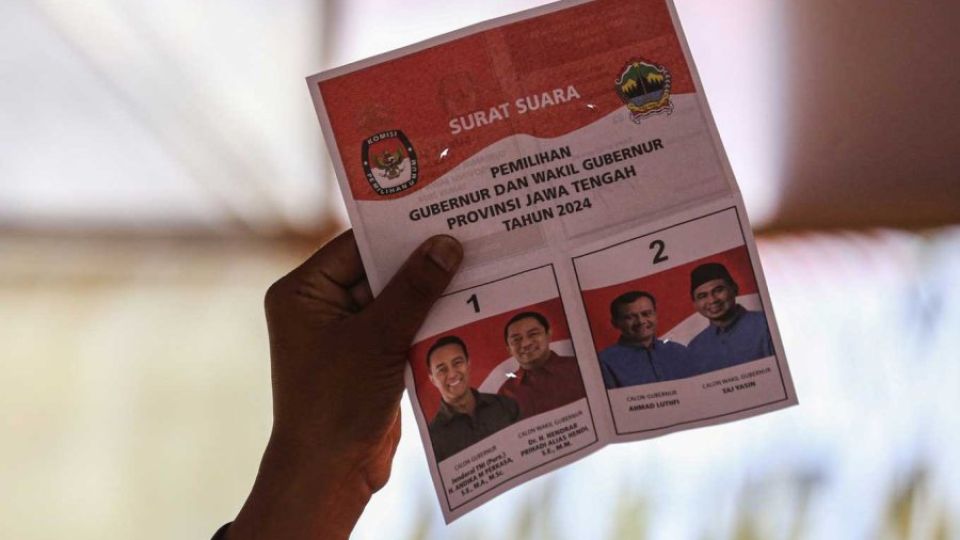November 29, 2024
JAKARTA – The likely victory of candidates backed by the ruling coalition in most strategic regions in this week’s regional elections is expected to solidify the power base that President Prabowo Subianto needs to implement his agenda over the next five years.
People across 37 provinces, 93 cities and 415 regencies voted for new governors, mayors and regents on Wednesday in the biggest simultaneous regional elections in the nation’s history.
While the official vote tabulation is still underway, quick counts of votes from sampled polling stations released by credible pollsters suggested that candidates backed by Prabowo’s big-tent Onward Indonesia Coalition (KIM) enjoy a decisive lead in the nation’s most populous provinces of West Java, Central Java and East Java. Some of these candidates were also endorsed by former President Joko “Jokowi” Widodo.
A Prabowo and Jokowi-backed candidate is also on course to win in North Sumatra, the largest province outside Java.
The capital Jakarta is the only province in Java where the KIM candidate for governor, Ridwan Kamil, is trailing behind former cabinet secretary Pramono Anung, the candidate from the Indonesian Democratic Party of Struggle (PDI-P), the only de-facto opposition party.
Many experts have described Wednesday’s elections as an extension of the power play between KIM and the PDI-P from February’s presidential race, which Prabowo won by a landslide.
Controlling battleground provinces will help Prabowo to ensure that regional administrations work hand in hand with the central government in implementing his campaign promises, said political analyst Aditya Perdana.
“The large KIM coalition was designed in the first place with the purpose of dominating both the executive and legislative branches in strategic regions,” Aditya, who is also a lecturer in political science at the University of Indonesia (UI), told The Jakarta Post on Thursday.
Having KIM-backed candidates leading these regions would “help ensure local administrations have the same view as the central government, so that national decisions will be implemented in regions,” Aditya said.
One of Prabowo’s signature programs is the free nutritious meal program aiming to feed 82 million children and pregnant women by 2027 to improve childhood nutrition, which has sparked questions as to how his administration will handle the sheer scale of the logistics for the program, its burden on the state budget and its effectiveness in curbing stunting and nutritional deficiency.
“Prabowo needs the local administrations to have harmonious working relations with the central government so that the national development agenda goes hand-in-hand with regional development,” Aditya said.
He pointed to an instance when former Jakarta governor Anies Baswedan publicly rejected the way the central government, during Jokowi’s presidency, handled the COVID-19 pandemic as an example of what Prabowo was looking to avoid.
Analyst Agung Baskoro of Trias Politika Strategis said that candidates aligned with the President would be more responsive to implementing his flagship programs in regions.
“Regions where KIM candidates are on course to win could expect acceleration in the implementation of Prabowo’s campaign promises, such as his free meal program, his plan to strengthen human resources and increase the quality of health, and many more,” Agung said.
Prabowo, in his inaugural speech as President last month, also vowed to achieve food and energy self-sufficiency by the end of his administration.
A senior politician of Prabowo’s Gerindra Party has expressed the hope that future leaders in local administrations will collaborate with the central government, noting that Prabowo will also provide support for programs initiated by local administrations.
“Whoever is elected throughout Indonesia, we will help and support [them] so they can implement their programs, synergize positively with and support the programs of the Prabowo government,” Gerindra Party politician Ahmad Riza Patria told reporters, as quoted from Kompas TV.
But while the quick count results from Wednesday’s elections indicate the strength of KIM’s machine in consolidating support for the Prabowo government, it “does not guarantee a long-term commitment” from KIM political parties to the success of Prabowo’s programs, Aditya said.
This is because not all KIM candidates are Gerindra members or loyalists of Prabowo and each of their own political parties has its own needs, he said.
“Once the honeymoon period is over and disagreement arises, for example, over any future cabinet reshuffles, KIM political parties could easily shift their allegiances, which will also influence how regional heads will position themselves toward Prabowo’s programs,” Aditya said.


